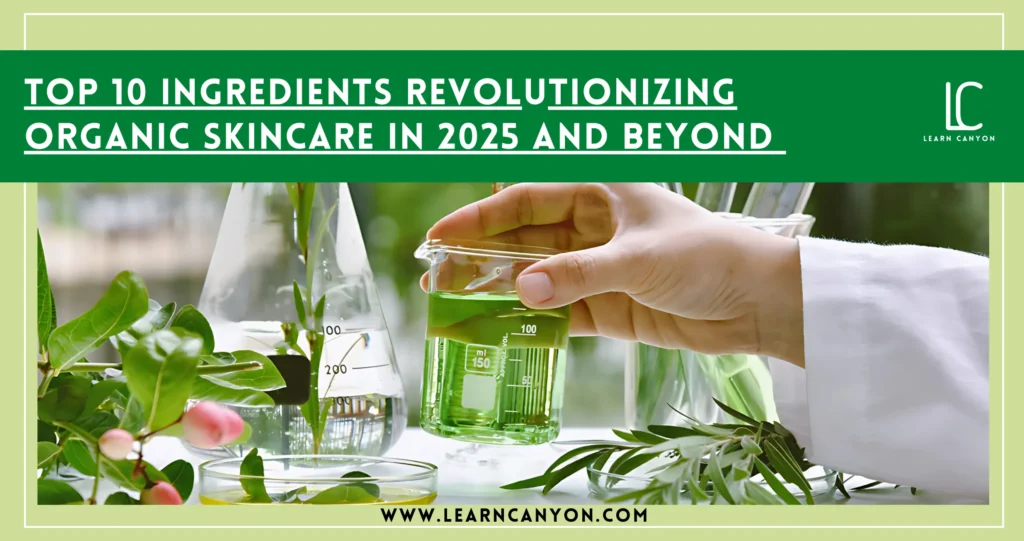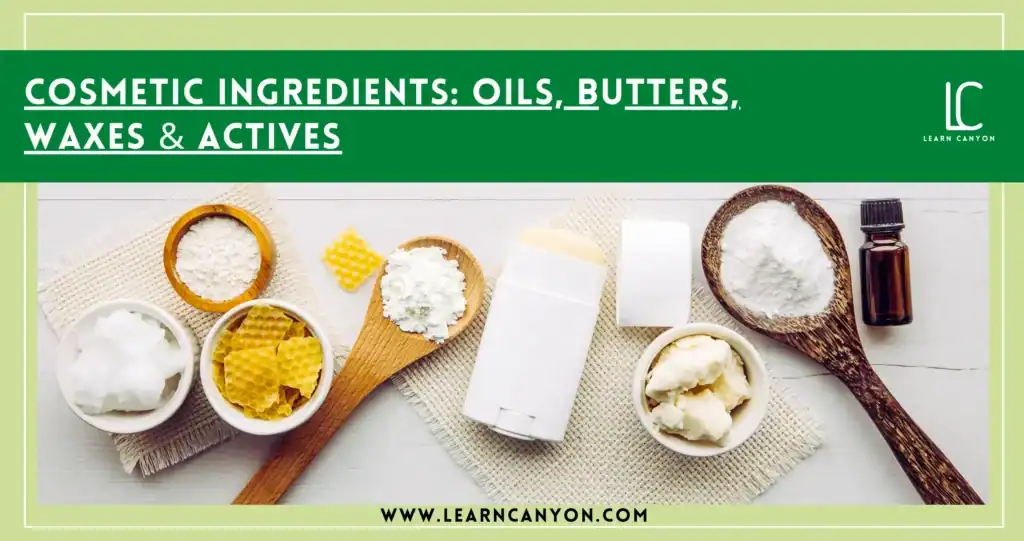The beauty industry is constantly evolving, and as a professional formulator, I can confidently say we’re witnessing a remarkable transformation in organic skincare.
It’s not just about creating products that feel luxurious or smell divine, it’s about harnessing the incredible power of nature in ways we couldn’t have imagined a decade ago.
In 2025, organic skincare is no longer limited to traditional herbal infusions or basic plant-based formulas. Today, cutting-edge technologies like bio-fermentation, blue biotechnology, and advanced encapsulation methods are redefining what “natural” truly means. These innovations are bridging the gap between science and sustainability, giving us ingredients that are not only incredibly effective but also environmentally responsible.
If you’re someone who’s passionate about clean beauty, trust me you’ll want to know about these trailblazing ingredients.
They’re not just game-changers; they’re shaping the future of skincare.
Let’s now know the top 10 ingredients that are revolutionizing organic skincare and why they deserve a spot in your routine!
Top 10 Ingredient Trends Shaping the Future
As a professional formulator, I can tell you that the world of organic skincare is buzzing with innovation. The focus isn’t just on making products natural, it’s about making them perform better, last longer, and truly transform the skin while staying eco-friendly.
Here are the top ingredient trends that are taking organic skincare to the next level:
1. Bio-Ferments:
Imagine taking the natural benefits of plants and supercharging them. That’s exactly what bio-fermentation does. By fermenting ingredients like rice, kombucha, or even algae, we unlock nutrients that are more bioavailable, meaning your skin can absorb and use them more effectively. Plus, bio-ferments naturally support the skin’s microbiome, making them a must-have in modern formulations.
2. Bakuchiol:
If you’re looking for all the benefits of retinol think smoother skin, fewer wrinkles, and an even tone without the irritation, bakuchiol is your new best friend. Derived from the babchi plant, this ingredient is gentle on sensitive skin and works beautifully in organic formulations.
3. Marine Algae & Blue Biotechnology:
The ocean is an endless source of skincare innovation. Ingredients like Spirulina, Chlorella, and Sea Kelp are packed with antioxidants, vitamins, and minerals. They hydrate, repair, and protect the skin while being sustainably harvested. Advances in blue biotechnology are even making these marine treasures more accessible and eco-friendly.
4. Probiotics and Postbiotics:
Healthy skin starts with a healthy microbiome, and probiotics are here to help. These live cultures (and their byproducts, postbiotics) strengthen your skin barrier, reduce inflammation, and promote a radiant complexion. Encapsulation technology is making it easier than ever to include these sensitive ingredients in skincare.
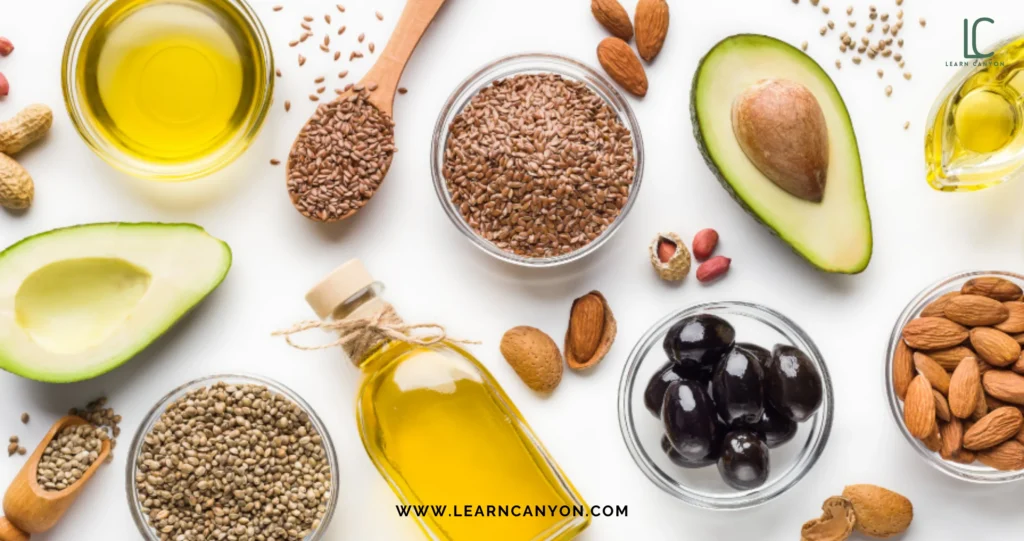
5. Upcycled Ingredients:
Who knew waste could be so beautiful?
Upcycled ingredients like coffee grounds, fruit peels, and olive pits are turning byproducts into powerful skincare heroes. Not only do they reduce environmental impact, but they’re also loaded with antioxidants and exfoliating properties.
6. Plant-Based Collagen Alternatives:
Collagen is a staple in anti-aging skincare, but now plant-based alternatives are stepping into the spotlight. Algae-derived collagen and other vegan sources are providing the same skin-plumping benefits without relying on animal sources.
7. Natural Peptides:
Peptides are the unsung heroes of skincare, and plant-derived versions are taking center stage. These natural proteins help repair the skin, boost elasticity, and reduce signs of aging. Think rice, lupine, and quinoa peptides for an organic twist on this skincare essential.
8. Cold-Pressed Oils:
Cold-pressed oils are a staple in organic formulations for a reason. By avoiding heat during extraction, these oils retain their nutrients, giving your skin the best of what nature has to offer. Oils like rosehip, moringa, and marula are rich in fatty acids, vitamins, and antioxidants.
9. Exosome Technology:
Exosome technology is the future of ingredient delivery. Plant exosomes act as tiny messengers, delivering nutrients directly to skin cells for targeted repair and regeneration. They’re a game-changer for anti-aging and repair-focused organic products.
10. Adaptogens: Stress Relief for Your Skin
Adaptogens like Ashwagandha, Gotu Kola, and Schisandra are traditionally known for their wellness benefits, but they’re just as powerful in skincare. These herbs help the skin adapt to stress, calm inflammation, and promote resilience, making them perfect for our busy, modern lives.
These trends show how nature and science can work hand in hand to create products that not only care for your skin but also for the planet.
Whether you’re a skincare enthusiast or just starting your journey, these ingredients are worth keeping an eye on and incorporating into your routine.
How to incorporate these ingredients in formulations?
When it comes to incorporating innovative ingredients into your formulations, it’s all about understanding how they behave and what they need to perform at their best. Let’s break it down, step by step, so you can make the most of these incredible components in your organic skincare creations.
Take bio-ferments, for example. These supercharged versions of natural ingredients thrive in water-based products like toners, serums, and mists. They’re most effective when added during the cool-down phase to protect their active cultures. Keep an eye on the pH most bio-ferments love a range of 4-5, so make adjustments if needed. Imagine a calming facial mist infused with fermented rice water hydrating, soothing, and perfect for sensitive skin!
Then there’s bakuchiol, the natural retinol everyone’s talking about. This gentle, plant-based wonder works beautifully in night creams, facial oils, or anti-aging serums. Add it during the oil phase at around 0.5–1%, and for even more impact, pair it with antioxidants. It’s a perfect fit for people seeking the benefits of retinol without irritation.
If the ocean inspires you, marine algae and blue biotechnology ingredients are a dream to work with. Algae extracts like spirulina and sea kelp bring intense hydration and repair to formulations. They work well in creams, gels, or serums and can be added in the water phase or cool-down phase, depending on the extract. These treasures are as eco-friendly as they are effectively a win-win!
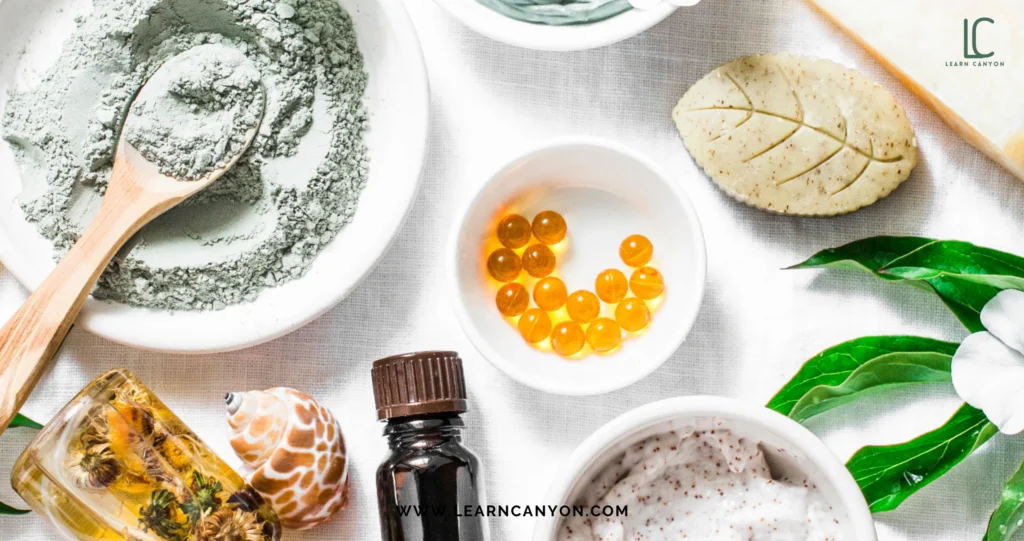
For those of you focusing on microbiome health, probiotics and postbiotics are a game-changer. Probiotics often come encapsulated for stability, making them easier to incorporate into formulations like creams and serums. Postbiotics, on the other hand, can be added directly. Just keep your product’s pH between 4 and 5.5 to ensure these delicate actives stay effective.
Now let’s talk about sustainability. Upcycled ingredients like coffee grounds or fruit peel powders are fantastic additions to exfoliating scrubs or eco-conscious masks. They’re not just environmentally friendly they’re rich in nutrients, too. When using these ingredients, pay attention to particle size to ensure they’re gentle on the skin.
If you’re exploring anti-aging formulations, plant-based collagen alternatives and natural peptides should be on your radar. Algae-derived collagen is a fantastic substitute for traditional sources, offering hydration and elasticity without relying on animal-derived ingredients. Similarly, natural peptides, like those derived from rice or quinoa, are excellent for boosting firmness and reducing fine lines. Add them during the cool-down phase to maximize their benefits.
Cold-pressed oils like rosehip and marula are staples in organic skincare for a reason. Their extraction process preserves all the nutrients your skin loves. Use them in the oil phase for emulsions or as the base for rich facial oils. The key is to avoid overheating so they retain their potency.
For a touch of cutting-edge technology, consider exosomes. These plant-based messengers deliver nutrients directly to the skin, making them perfect for targeted serums. Since they’re sensitive to heat and pH, they’re best added during the cool-down phase in small amounts, usually around 0.1–0.5%.
Finally, let’s not forget about adaptogens. These stress-relieving herbs, like ashwagandha and gotu kola, are ideal for calming creams and serums. Whether they’re water-soluble or oil-soluble, they can seamlessly fit into various formulations, promoting resilience and balance for stressed skin.
The secret to working with all these ingredients is careful planning. Stability testing is a must to ensure your product holds up over time. Choosing the right preservative system, balancing the pH, and selecting protective packaging are all crucial steps in bringing your formulation to life.
Why These Ingredients Stand Out
I often get asked, “What makes some ingredients more special than others?”
The answer lies in their ability to deliver effective results while staying true to the principles of organic and sustainable skincare. The ingredients we’ve discussed are not just trendy they’re transforming skincare in ways that were unimaginable a few years ago.
Let me break it down for you:
1. They Bridge Science and Nature
These ingredients represent the perfect marriage of nature’s wisdom and scientific innovation. For example, bio-fermentation takes natural ingredients like rice or algae and enhances their potency through cutting-edge processes. It’s like giving nature a little extra boost to help your skin thrive.
2. Sustainable and Eco-Friendly
One of the biggest challenges in skincare today is creating products that work without harming the planet. Ingredients like upcycled coffee grounds and plant-based collagen alternatives do just that. They’re proof that we can create high-performance formulations without compromising on sustainability.
3. Skin-Compatible and Gentle
Gone are the days when effective skincare had to come with side effects like redness or irritation. Ingredients like bakuchiol and probiotics are gentle yet powerful, making them perfect for all skin types, including sensitive skin.
4. Innovative Delivery Systems
Here’s where it gets exciting: ingredients like probiotics and exosomes are being encapsulated or bio-engineered for better absorption. This means they don’t just sit on your skin they actually penetrate where they’re needed most, offering targeted benefits that you’ll notice over time.
5. Multifunctional Benefits
Why settle for one benefit when you can have several? Adaptogens, for instance, calm inflammation, boost resilience, and help the skin adapt to stress—all in one go. Marine algae not only hydrates but also protects against environmental damage. These multitasking ingredients make your skincare routine more effective and efficient.
6. Consumer-Driven and Transparent
Today’s consumers are smarter than ever. They demand transparency, efficacy, and sustainability, and these ingredients deliver on all fronts. Whether it’s plant-based peptides or cold-pressed oils, these components come with a clear story of what they are and how they work.
7. Future-Proofing Skincare
These ingredients are not just about addressing current concerns they’re designed to meet the skincare needs of the future. As our understanding of the skin deepens, these components are being fine-tuned to deliver even better results in hydration, anti-aging, microbiome health, and environmental protection.
When you look at the big picture, it’s clear why these ingredients are standing out. They’re not just about looking good on a label they’re about delivering real results in a way that aligns with what modern skincare should be: effective, responsible, and forward-thinking.
Whether you’re a formulator like me or a skincare enthusiast, these ingredients are worth paying attention to. They’re shaping the products we’ll be using not just today but for years to come.
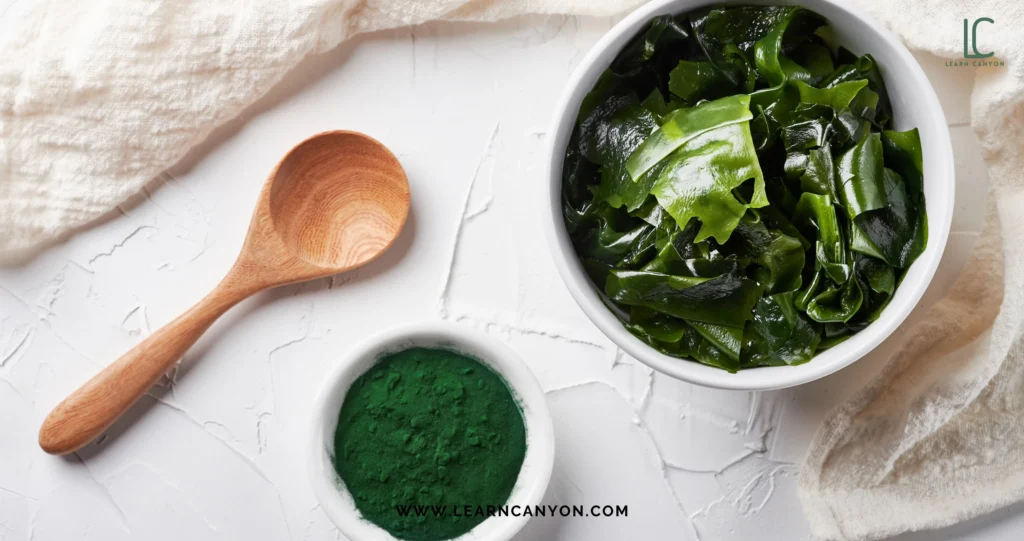
What This Means for Organic Skincare
Now as a formulator, I’m thrilled to see how far organic skincare has come and where it’s headed. These innovative ingredients aren’t just trends; they’re a sign of a deeper shift in how we approach beauty.
Let’s take a moment to explore what this means for the future of organic skincare.
1. A New Standard for Performance
Gone are the days when organic skincare was seen as less effective than conventional products. Ingredients like natural peptides, marine algae, and bio-ferments are proof that organic formulations can deliver powerful results. This means we no longer have to choose between clean ingredients and visible improvements to our skin.
2. Sustainability at the Core
The focus on upcycled ingredients, plant-based alternatives, and sustainable harvesting methods is changing the game. Organic skincare is no longer just about what’s in the bottle it’s about how those ingredients got there. This shift is making the beauty industry more eco-conscious, reducing waste, and encouraging brands to think holistically.
3. Skincare That’s More Inclusive
With gentle yet effective ingredients like bakuchiol, probiotics, and adaptogens, organic skincare is becoming accessible to more people. Whether you have sensitive skin, specific concerns, or are just starting your skincare journey, there’s something for everyone in this new wave of innovation.
4. The Rise of Smart Formulation
One of the most exciting developments is how science is being used to enhance natural ingredients. Technologies like encapsulation and fermentation are creating products that are more effective, long-lasting, and tailored to individual skin needs. This is organic skincare that doesn’t just feel good it works at a deeper level.
5. A Focus on Holistic Wellness
Organic skincare is no longer just about what you apply to your skin it’s about the connection between your skin, body, and mind. Adaptogens, probiotics, and other ingredients are addressing stress, inflammation, and overall resilience, making skincare part of a larger wellness journey.
6. Consumers as Co-Creators
Today’s consumers are informed, vocal, and deeply invested in the products they use. This means formulators like me are working closely with what people actually want: transparency, efficacy, and sustainability.
The result?
Products that reflect the values and priorities of modern skincare lovers.
7. The Future Is Bright (and Green)
Looking ahead, it’s clear that organic skincare is set to lead the way in the beauty industry. With innovations in ingredient technology and a growing commitment to sustainability, the future is all about blending the best of nature and science.
For me, as a formulator, this evolution is incredibly inspiring. It challenges us to think creatively, push boundaries, and keep innovating while staying grounded in nature. For you, as a skincare enthusiast, it means having access to products that truly work while aligning with your values.
This isn’t just a trend, it’s a revolution in how we think about beauty, and it’s exciting to be part of it! I can confidently say we’re entering an exciting era for organic skincare. The ingredients we’ve explored aren’t just about following trends, they’re about creating a lasting impact on how we care for our skin and our planet.
What’s truly inspiring is how these innovations blend the wisdom of nature with cutting-edge science. From probiotics supporting your skin’s microbiome to upcycled ingredients reducing waste, each advancement reflects a deeper commitment to sustainability, effectiveness, and inclusivity.
For those of us who love organic skincare, this isn’t just about products it’s about a movement. A movement that prioritizes transparency, respects the environment, and celebrates the uniqueness of everyone’s skin.
Whether you’re a curious consumer or a fellow formulator, these ingredients represent more than solutions; they represent the future of beauty. And I, for one, can’t wait to see how this journey continues to unfold.
So, as you look ahead to 2025 and beyond, keep an eye out for these revolutionary ingredients. They’re not just changing skincare, they’re changing the way we think about beauty, science, and sustainability. And that’s something worth celebrating.
Here’s to glowing skin, a greener planet, and the incredible innovations shaping organic skincare!




